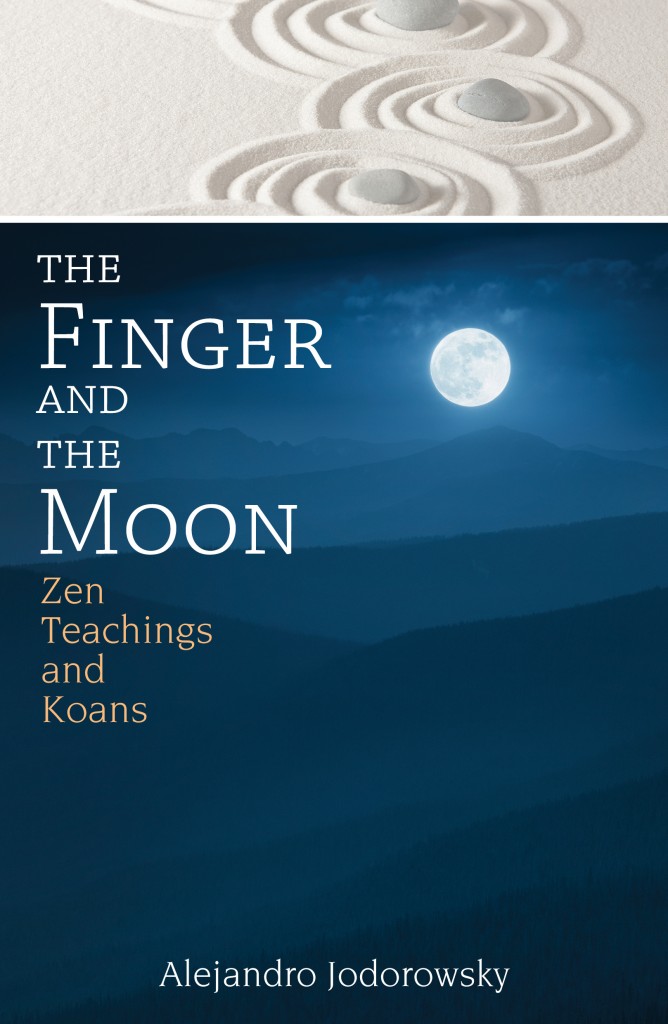The following is excerpted from Finger and the Moon by Alejandro Jodorowsky, published by Inner Traditions.
(Mexico, 1961)
The first time I went to the zendo, the master showed me a poem that ended like this:
He who has nothing but feet will contribute with his feet.
He who has nothing but eyes will contribute with his eyes to this great spiritual work.
Throughout his prayers, the master coughs and sneezes. I just try to meditate, barely daring to breathe.
The master no longer prays.
These chants are him. The prayers cough and sneeze.
The student meditated in a corner of the zendo. Fearing that it might become a habit, he went to the opposite corner.
He passed through the four corners of the zendo, and through all the places where people meditated. The master always meditated in the same place; however, nothing was done by rote.
The disciple insisted on taking off his shoes before entering the zendo, with its hardwood floor. He had dirtied his feet. As he sat down on the wooden parquet, he stained it.
The master only took off his shoes when he sat in his place.
When he went to the master’s house, the disciple took off his shoes so that he would not stain the floor, but when he visited his friends, he didn’t even bother to wipe the soles of his shoes on the mat at the entrance.
The master invited the disciple to sit in the garden. He took out a straw chair and brought it. But halfway through, he gave the chair to the disciple.
The master said,
“From Mexico City we can see Popocatepetl.* But from Popocatepetl we can’t admire Popocatepetl.”
When the master prayed, his words produced a musical vibration. I was grateful for this sound because it made my cells vibrate; it put them in order, like a magnet, in one direction. The words became irrelevant to me.
Before departing, the master wanted to give me his cane—the keisaku—as a gift.
These were my feelings: “If you have a cane, I’ll take it from you; if you don’t, I’ll give one to you. Oh, infinite mercy! I do not thank you. I didn’t have one and you wanted to give it to me. Now I have it, so take it away from me. Only thus would you have truly given it to me. Allow me to refuse your gift. One day my hands will blossom, and I will not need a cane because I will be able to strike your shoulder with my palm (and with my fingers).”
The master said: “If you do a good deed and you tell someone about it, you lose any benefit it might have brought to you.” But he boasted about every good deed he did. He advertised it, not out of vanity but to avoid any inner gain for himself.
He wanted to do good without asking for anything in return.
A temple is not the “exclusive” place of the sacred. We go to the temple to learn the sense of the sacred. If the lesson has been understood, the entire earth becomes a temple, every man becomes a priest, and every food is a Communion host.
The master strikes me twice on the shoulder with his keisaku, which is a long, thin cane with a flat end. It has Japanese characters engraved on both ends. I ask him what they mean.
The characters on the striking end say, “I can’t teach you anything. Learn by yourself—you know!” The characters on the other end say, “Grass blossoms in spring.”
The master adds, “First, meditation, then comes spring and everything blossoms.”
Suddenly, the master touches the disciple’s mouth and asks him, “Why is it injured?” The disciple replies, “I had an accident.”
And the master says, “One day your eyes will be very beautiful.”
The Essential Sound of Emptiness
The disciple approaches the master and asks, “What is the essential sound of emptiness?”
The master replies, “What is the essential sound of emptiness?”
“You are the master. I don’t know the answer, that’s why I’m asking.”
The master strikes him on the head. The disciple becomes enlightened.
The master has ceased to be identified with his ego; he has surrendered himself to emptiness, to inner silence. The only sound that resonates within him is his disciple’s question. The latter mistakes the master’s answer with the question he asks his own intellect, without realizing that the master does nothing but imitate him.
“You are the master. I don’t know the answer; that’s why I’m asking.”
This is an absurd answer. The master doesn’t want to ask him a question but imitates the sound of his words, devoid of any meaning. The disciple seeks concepts; he doesn’t want to quit his intellectual pursuit. The master, striking his head, interrupts the flow of words. In just an instant the spirit becomes wordless.
Finally the disciple understands.
The master is no longer a person.
Everything else, the world, is the essential sound of emptiness. When the self ceases to exist, the world exists.
***












